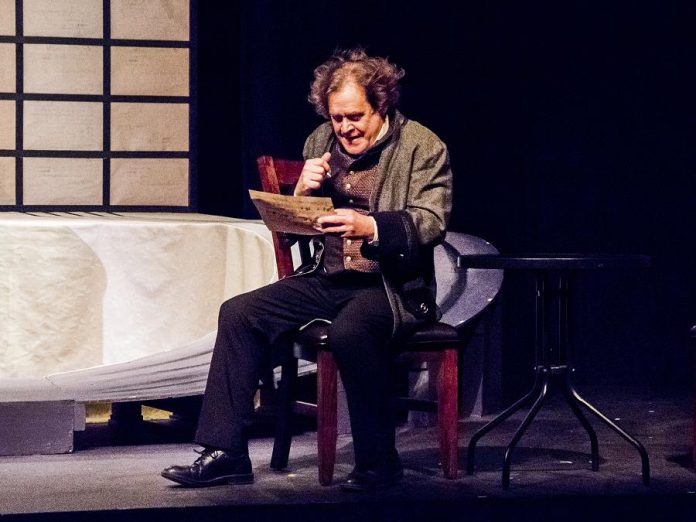
From January 17th to February 1st, historical drama and modern storytelling merge when the Peterborough Theatre Guild presents Moises Kaufman’s 33 Variations.
The directorial debut of Chris Lee, 33 Variations is a moving journey of one woman’s obsession with Ludwig Von Beethoven’s Diabelli Variations, paired with a dramatization of the final years of Beethoven’s life as he creates his 33 variations of a waltz composed by Austrian music publisher Anton Diabelli. Not only is musical history explored through the story, but also multiple human relationships, resulting in a very real and emotional drama.
Written by Kaufman in 2007, 33 Variations made its debut at the Arena Stage in Washington, DC in 2007 in a production directed by the playwright. The show would make its Broadway debut in 2008 at the Eugene O’Neil Theater, featuring Jane Fonda as lead character Katherine Brandt and character actor Zach Grenier as Beethoven.
The Broadway production, which represented Jane Fonda’s return to the Broadway stage after 46 years, earned five Tony nominations, including for best play, actress, and actor, and won the award for best scenic design.
33 Variations features two storylines in two eras, one in the present day following musicologist Katherine Brandt (Jane Werger) and the other in 19th-century Vienna following composer Ludwig Van Beethoven (Christopher Spear).
In the first timeline, Dr. Katherine Brandt is a lifelong student of Beethoven’s life and music and, when a sudden change in her situation turns her life upside down, she drops everything to travel to Bonn, Germany to study Beethoven’s original documents and to solve the riddle of the Diabelli Variations.
Her goal is to try to understand why Beethoven became so obsessed with Diabelli’s mediocre waltz that he composed 33 variations of the waltz between 1819 and 1823.
In the second timeline, the audience is taken back to 19th-century Vienna to explore the relationship between Beethoven, Diabelli (David Geene), and Beethoven’s assistant Anton Schindler (Jason Shulha). Taking place during the most dramatic period of Beethoven’s life, the story explores the history of the variations and Beethoven’s emotional and mental state during his final years.
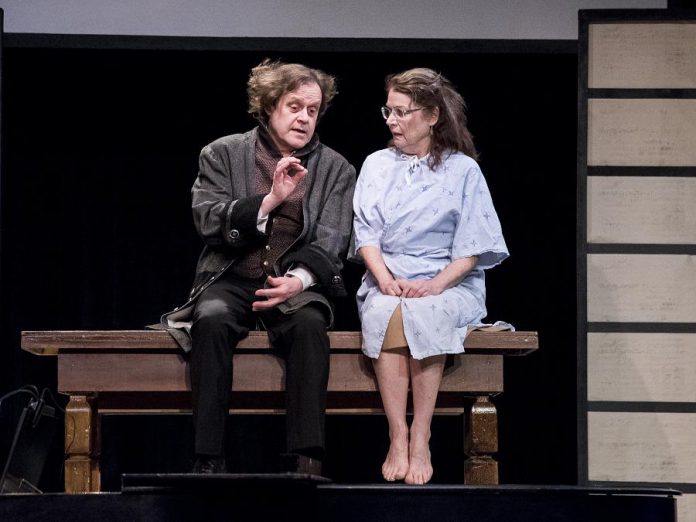
The show also contains some other poignant sub-plots, including Katherine’s relationship with her disapproving daughter Clara (Caitlin O’Connor), Clara’s romance with Katherine’s nurse Mike (Kevin O’Neill), and the blossoming friendship between Katherine and Beethoven archivist Dr. Gertrude Landenburger (Gayle Fraser).
“33 Variations is all about the journey that Beethoven and Katherine go on to understand creativity,” explains director Chris Lee. “You can always ask where ideas come from, but you can’t really answer that. Nobody knows. So both Beethoven and Katherine become obsessed with this one piece of music. It’s a story about a woman’s passion.”
“Or a woman’s folly, depending how you look at it,” quips the show’s star Jane Werger.
Jane gives a powerful performance as a woman running out of time and throwing herself into her work as she watches her life change around her. When her work consumes her, the story taking place in Beethoven’s time takes centre stage.
“Katherine is a musicologist and has studied Beethoven her whole life, so he’s her specialty,” Jane says. “She has had some recent changes in her life and she feels, that while she is still able, she wants to discover why Beethoven considered a very mediocre waltz written by Diaobelli to be so important. So she’s going to the archives in Bonn, where she meets Gerti, who takes care of the archives, and she begins her research to try to discover why Beethoven wrote so many variations of this waltz.”
But Katherine’s obsession with Beethoven is nothing more than a distraction from having to face her own reality, or from connecting emotionally with the people around her — especially her daughter Clara whom doesn’t understand her mother’s desire to go to Germany during such a crucial time in her life.
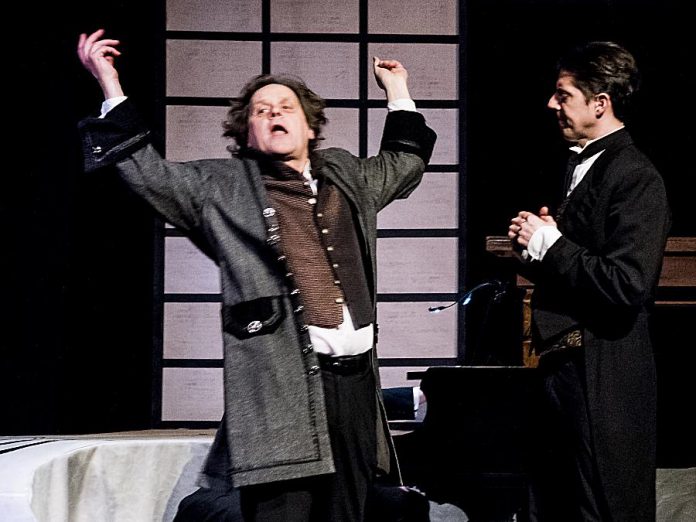
“The relationship between my character and her mother is rough,” Caitlin says. “Her mother is obsessed with the work and, at a time when you think someone should be slowing down and spending time with their family, instead she’s flying across the world to study. So our relationship is trying to find the middle ground: how we can connect while trying to find that relationship where we can be the two separate people that we are.”
Christopher Spears makes a strong and compelling Ludwig Von Beethoven, bringing alive both his genius and madness while exploring the difficult individual that history has told us he is.
“Beethoven is touch and go,” Christopher says. “He is in his own world while being aware of the world around him. There are elements of his real life that are brought into the show, but towards the end — because he was very ill and at the same time he’s composing the 9th, the Mass, and the Variations — it’s all coming out and he’s a mess. Ironically, that’s when he went deaf.”
While Beethoven is the most iconic figure in the play, often he is more of a supporting figure or an idea and it is actually his assistant, Anton Schindler, who takes centre stage in the historical timeline. He becomes an audience favourite by being the most relatable of the historical characters. As Anton, Jason Shulha is the audience’s guide through the history, and the past storyline becomes centred around his relationship with Beethoven as much as it is around the composition of the Diabelli Variations.
“Beethoven’s relationship with Schindler is mixed,” Christopher notes. “It’s a strange relationship. They are not really friends, and he’s not really an employee. He’s fired halfway through the show, but he stays around. But Beethoven is dependent on Schindler, especially as he becomes ill.”
“I always viewed Schindler as being obsessed with Beethoven,” Chris Lee adds. “Everybody has their little obsessions in this show.”
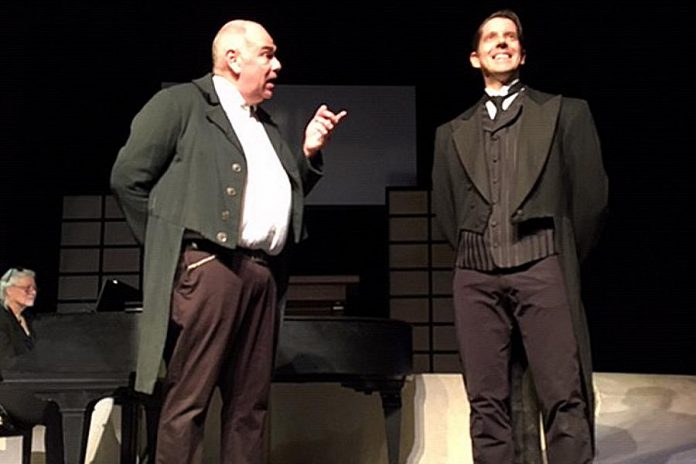
Although history is an important part of the story’s narrative, don’t be intimidated if you are not immediately familiar with Beethoven or the Diabelli Variations. The history comes alive through the drama, and the story becomes relatable through Katherine’s journey and the various subplots surrounding her life. Together, the entire cast is a strong ensemble that keeps the audience engaged in this heartfelt and moving drama.
At the centre of the show is the music itself, performed by pianist Karen Locklin. Sitting centre stage at a grand piano, Karen makes her stage debut as a solo pianist as she performs the Diabelli Variations before the audience, providing an important soundtrack to the show.
In a clever and well-constructed set created by Ian Burns, Karen and her piano are often the most important element to the show, but also manage to slip seamlessly into the background as the drama takes place literally around her.
VIDEO: Onstage pianist Karen Locklin rehearses Anton Diabelli’s waltz
“From a musical perspective, the Variations doesn’t appear to be a difficult piece of music when you look at it on the page,” says Karen of the music. “But because everything is interwoven and the voices are all within each other, it’s actually tricky to play. There are things within it that repeat themselves, and the basic premise is that Beethoven uses the first four notes of Diaboli’s waltz and goes through the 33 Variations. It’s incredible.”
“The music has different functions in the play,” Chris adds. “Sometimes it’s playing behind the dialogue to accentuate points, or it’s used as transitional music in-between scenes and it helps move the plot and character.”
33 Variations also makes use of projected images, which lends a special realistic element that brings history right before the audience in a potent way.
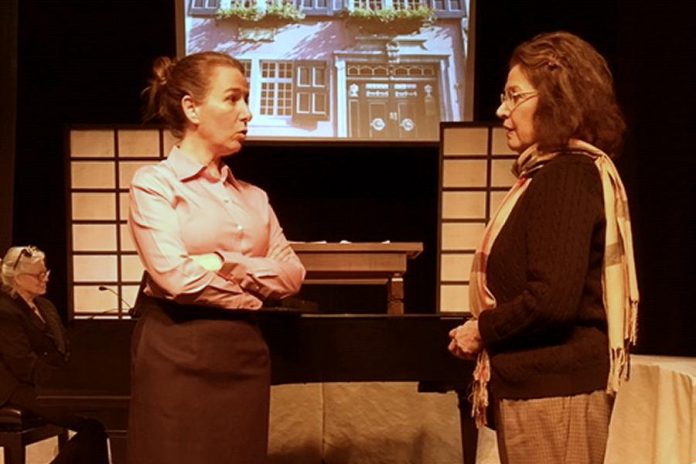
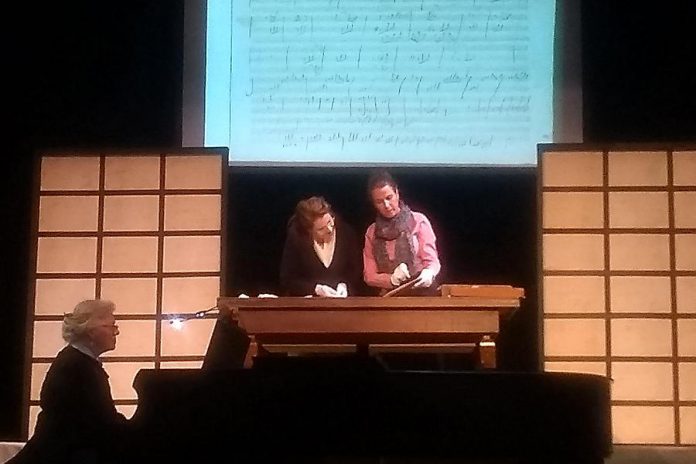
“One of the neatest aspects is that we’ve actually been in contact with the museum in Germany, because we had to buy the rights for specific shots of Beethoven’s work,” Chris explains. “As a result, the audience gets to see images of Beethoven’s actual music taken directly from the archives.”
The Peterborough Theatre Guild’s production of 33 Variations is a well-produced piece of drama that is both compelling and captivating and brilliantly performed and directed. I was drawn into the historical storyline, but found the real emotional peaks to be in Katherine’s story — her friendship with Gertrude and her difficult relationship with Clara — as well as Clara’s sweet relationship with Mike.
The most powerful moment of the show come when Katherine allows herself to stop thinking about Beethoven, mirrored with the moment Beethoven takes centre stage in his mad brilliance.
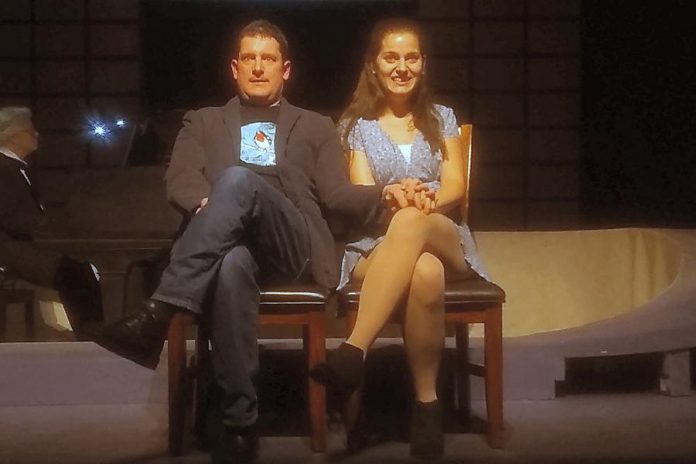
“I find that it’s a really realistic approach to a simple story,” Caitlin observes. “It’s not everything that’s grand. Katherine goes to the library every day and writes a book. That’s it. But the writing behind it is so sweet. It’s so simple, but it’s so real.”
“The work speaks for itself,” adds Jason. “It’s a good play and tells a good story. I think we’re doing justice to it. We have a good group and we’re looking forward to getting on stage and bringing it to life.”
Since the beginning of its season, the Peterborough Theatre Guild has been producing one strong play after another. 33 Variations is the next Peterborough Theatre Guild hit. You’ll want to see this compelling and heartfelt production — put it on your theatrical calendar this month.
33 Variations opens on Friday, January 17th and runs to Saturday, February 1st. Performances begin at 8 p.m., with 2 p.m. Sunday matinees on January 19th and 26th.
Tickets are $25 ($22 for seniors and $15 for students) and are available by calling the box office at 705-745-4211 (if not open leave a message) or online at theatreguild.org.


























